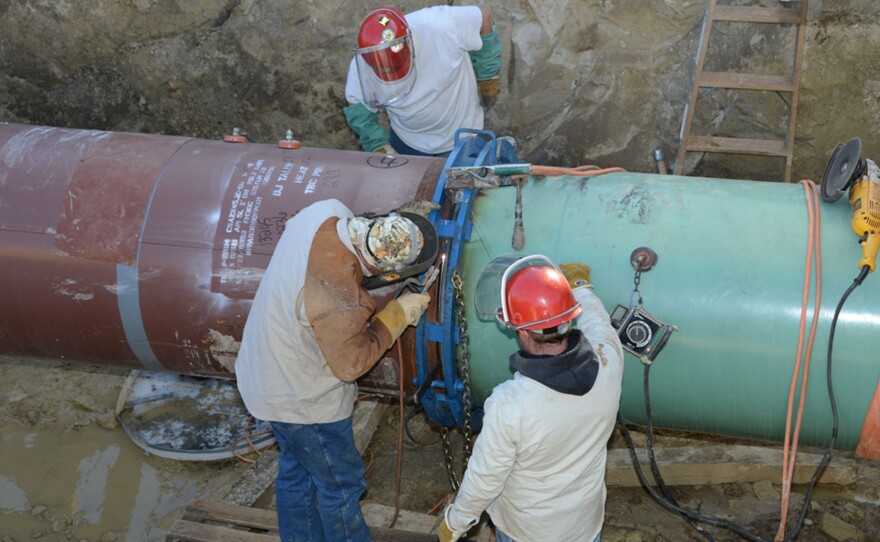
The State Department says that production of Canadian tar-sand crude, which has a bigger greenhouse gas footprint than other types of oil, is unlikely to be increased if the Keystone XL pipeline goes ahead -- and therefore would do little to contribute to climate change.
In the Final Supplemental Environmental Impact Statement on the controversial pipeline, the department takes no position on whether it should be built but notes that tar-sand crude produces 17 percent more greenhouse gases than conventional crude and as much as 10 percent more than heavy crude.
"This is only one piece of the information that we'll be considering going forward," State Department Assistant Secretary Kerri-Ann Jones tells NPR's Elizabeth Shogren.
The project has long been a lightning rod, not only for relations between Washington and Ottawa but within the U.S., where many conservatives say the project will create jobs, while others fear it will hurt the environment.
Reuters says the report reaffirms the idea that bituminous oil sand reserves require more energy to produce and process, and therefore result in higher emissions of greenhouse gases:
"But after extensive economic modeling, it also found that the line itself would not slow or accelerate the development of billions of barrels of reserves that environmentalists say would exacerbate global warming."
Now that the report has been released, the next step is for other federal agencies and the public to weigh in on it during a comment period that begins Feb. 5. While the study is not the final step in the process, it could be crucial in determining whether the project gets a final nod from the White House.
The Natural Resources Defense Council, which opposes the project, issued a statement after the report was released. "Even though the State Department continues to downplay clear evidence that the Keystone XL pipeline would lead to tar sands expansion and significantly worsen carbon pollution, it has, for the first time, acknowledged that the proposed project could accelerate climate change," NRDC International Program Director Susan Casey-Lefkowitz said, adding that President Obama "now has all the information he needs to reject the pipeline."
Ahead of the report's release, a spokesman for the company in charge of the project, TransCanada Corp., said the expectation is that the report would affirm earlier findings that the $5.4 billion pipeline is manageable from an environmental impact standpoint.
"Fifteen thousand pages of scientific and technical study published in four environmental analysis reports since 2010 have all concluded this project would have minimal impact on the environment," James Millar wrote in an email.
The proposed 1,179-mile pipeline extension would run from Hardisty, Alberta, to Steele City, Neb.
As we've reported in the past, the proposal is to extend the already existing Keystone pipeline:
"The southern leg of the Keystone XL, which went into normal operation in January 2014, ties into the existing Keystone pipeline that already runs to Canada, bringing up to 700,000 barrels of oil a day to refineries in Texas. At peak capacity, the pipeline will deliver 830,000 barrels of oil per day. While the pipeline is initially carrying U.S. light crude, it is expected to carry more heavy Canadian oil harvested from tar sands over the next year."
Update at 5:10 p.m. ET:
TransCanada Corp CEO Russ Girling says he's pleased with the report and that the case for the Keystone XL "is as strong as ever."
Copyright 2014 NPR. To see more, visit www.npr.org.






